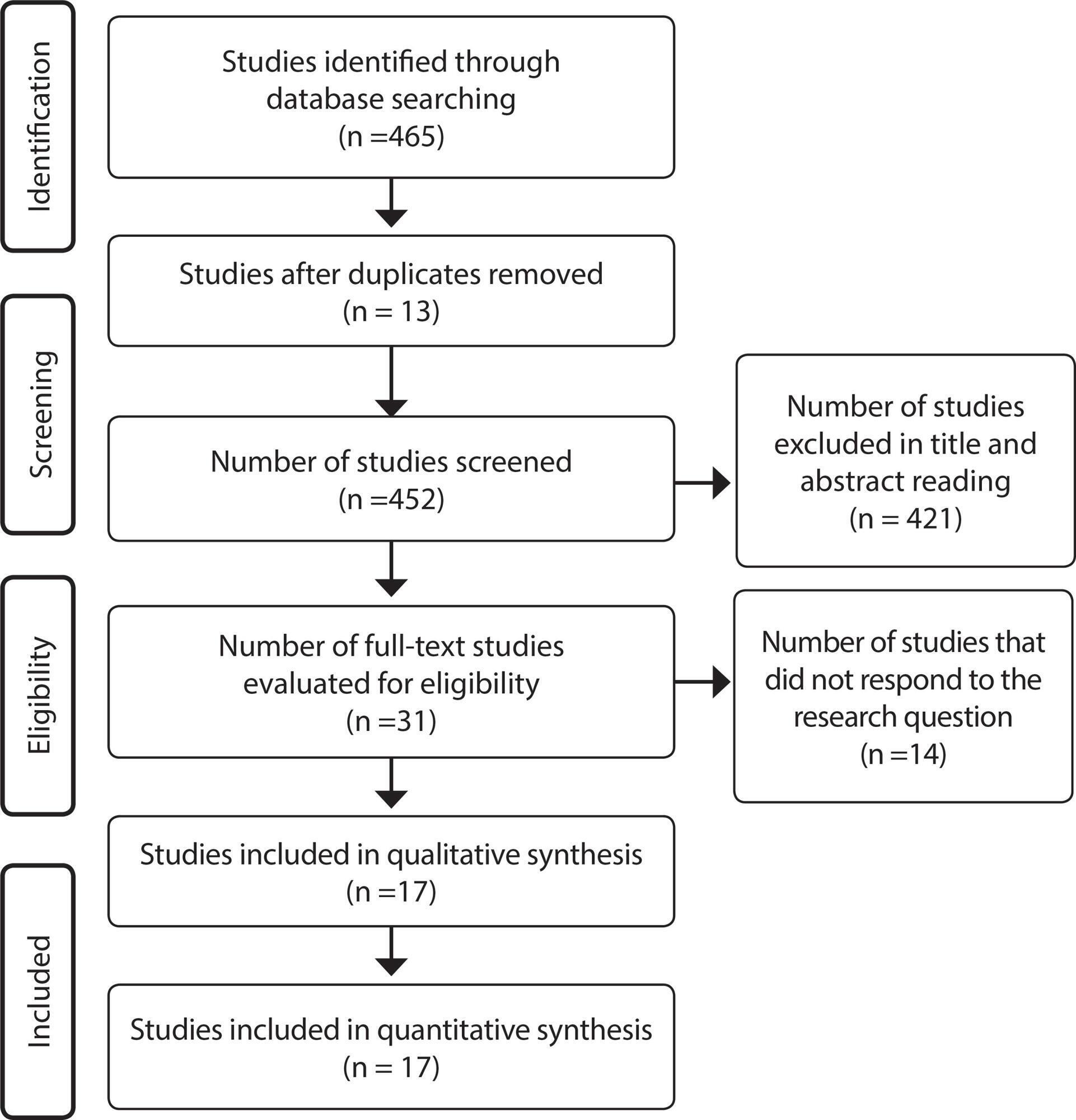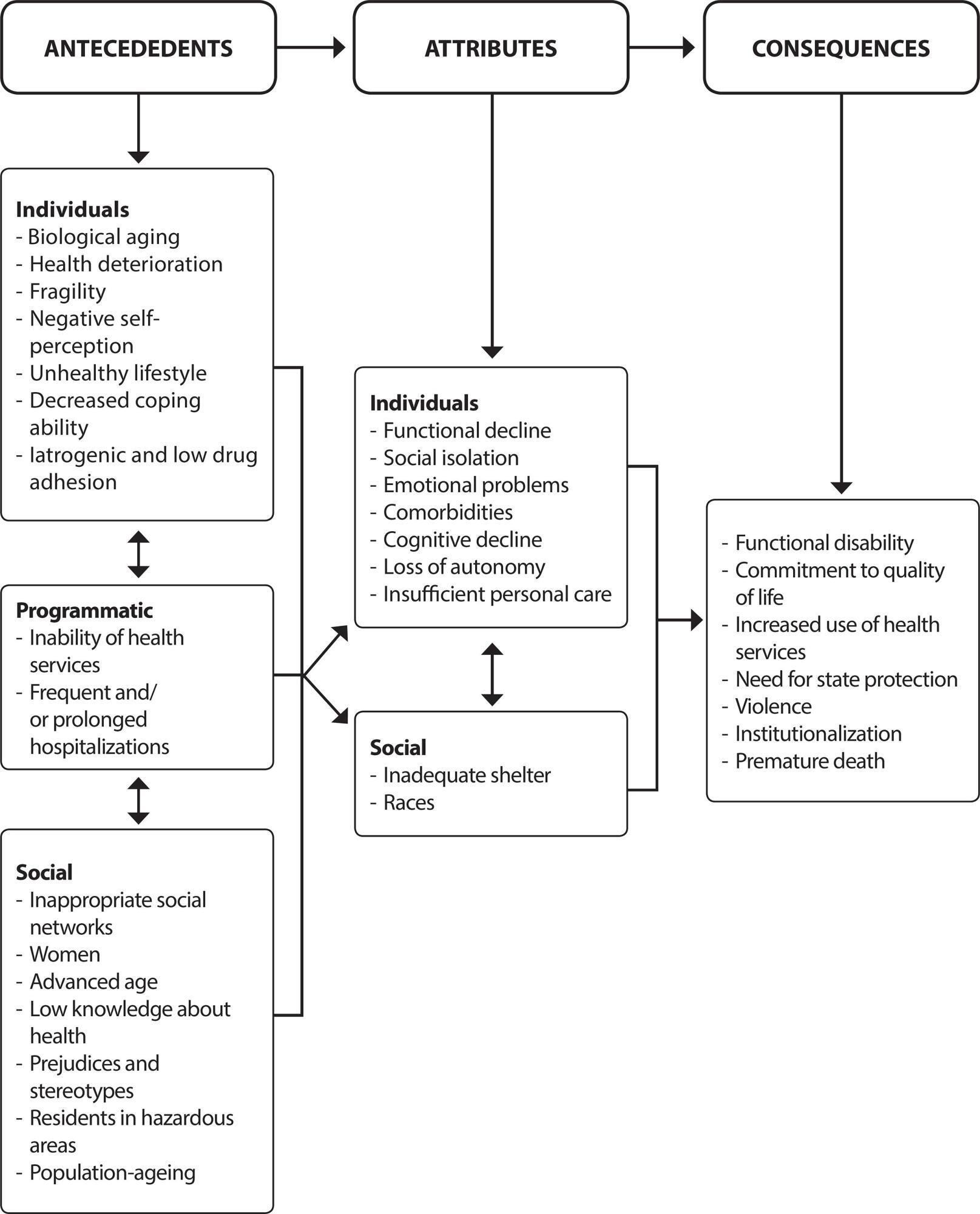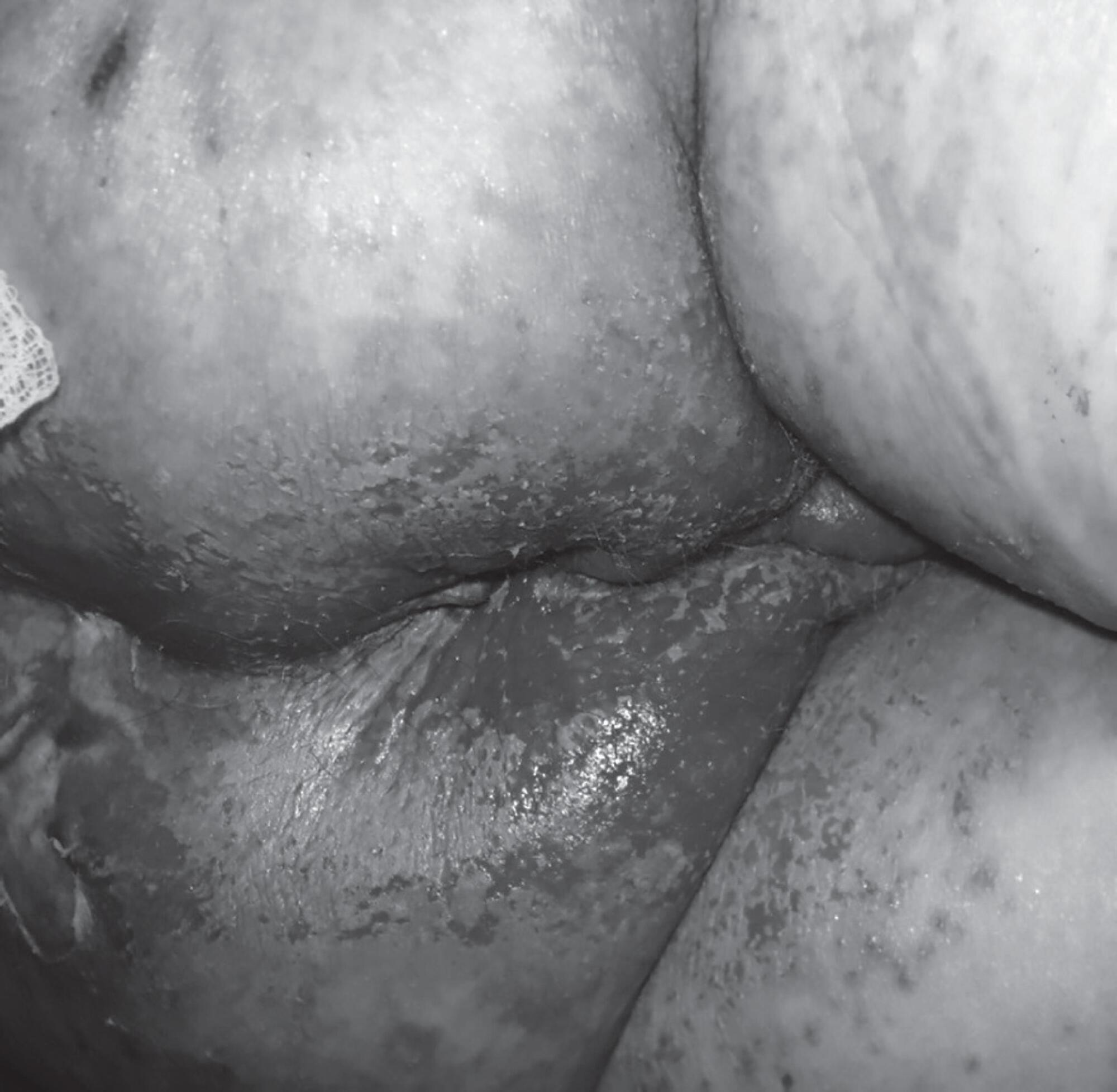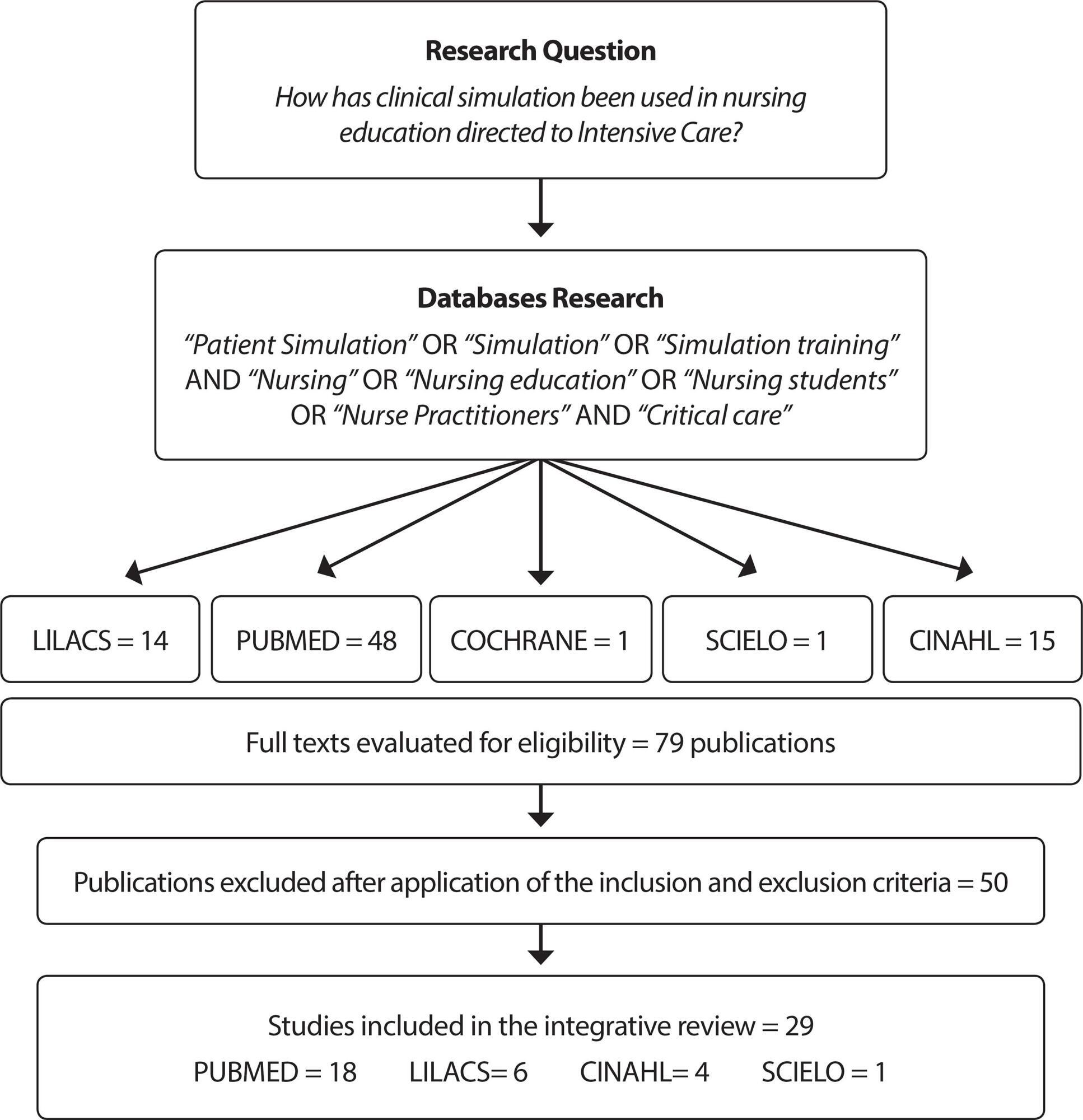-
ORIGINAL ARTICLE08-07-2023
King’s Parkinson’s Disease Pain Questionnaire: reliability and convergent construct validity
Revista Brasileira de Enfermagem. 2023;76(3):e20220379
Abstract
ORIGINAL ARTICLEKing’s Parkinson’s Disease Pain Questionnaire: reliability and convergent construct validity
Revista Brasileira de Enfermagem. 2023;76(3):e20220379
DOI 10.1590/0034-7167-2022-0379
Views0See moreABSTRACT
Objectives:
to assess the evidence of reliability and convergent construct validity of the King’s Parkinson’s Disease Pain Questionnaire.
Methods:
psychometric study of 75 older adults with Parkinson’s disease. The instrument was applied by two researchers separately and reapplied by one researcher 15 days later. In terms of reliability, internal consistency was assessed using the Cronbach’s alpha test and stability using the intraclass correlation coefficient. Scores of the King’s Parkinson’s Disease Pain Questionnaire were compared to those of the Geriatric Pain Measure in the assessment of construct validity.
Results:
the mean Cronbach’s alpha obtained between the three assessments was above 0.60, the intraclass correlation between the three assessments was above 0.90, and there was a weak but significant correlation between the two applied scales.
Conclusions:
the instrument showed adequate evidence of convergent construct validity and reliability, and can be used in clinical practice.
-
ORIGINAL ARTICLE08-07-2023
Systematization of Nursing Care: how did the concept mature?
Revista Brasileira de Enfermagem. 2023;76(3):e20220464
Abstract
ORIGINAL ARTICLESystematization of Nursing Care: how did the concept mature?
Revista Brasileira de Enfermagem. 2023;76(3):e20220464
DOI 10.1590/0034-7167-2022-0464
Views0See moreABSTRACT
Objectives:
to analyze the Systematization of Nursing Care conceptual maturation from the perspective of pragmatic utility.
Methods:
a concept analysis study. The stages were: select the concept; elaborate analytical questions; comprehensively review the literature; and determine concept structural components. Sixty-one documents were analyzed after a search carried out until October 2019.
Results:
four temporal periods of contextual changes have occurred since the emergence of ideas of a systematization in the 1960s. This first lasted until 1990. It was followed by those from 1990 to 2002, from 2002 to 2009 and from 2009 onwards. Partial conceptual maturity was identified, operationalization over the years, based on multiple definitions, and, currently, a concept of Systematization of Nursing Care with managerial and organizational attributes.
Conclusions:
the concept of Systematization of Nursing Care is partially mature, presents multiple definitions, being operationalized in uncertain connections with other concepts.
-
ORIGINAL ARTICLE08-07-2023
“Educational Material on HIV”: validity of health educational technology for people living with HIV
Revista Brasileira de Enfermagem. 2023;76(3):e20220549
Abstract
ORIGINAL ARTICLE“Educational Material on HIV”: validity of health educational technology for people living with HIV
Revista Brasileira de Enfermagem. 2023;76(3):e20220549
DOI 10.1590/0034-7167-2022-0549
Views0See moreABSTRACT
Objectives:
to validate the educational technology “Educational Material on HIV” (INPI – BR 10 2020 003765 0).
Methods:
a methodological study with 39 expert judges in HIV/AIDS, using a 5-point Likert scale for assessment. Data were tabulated, processed and analyzed through descriptive analysis. Cronbach’s alpha and McDonald’s omega tests were performed to analyze internal consistency, and the Intraclass Correlation Coefficient, for reliability. Agreement was established by a Level Content Validity Index greater than 0.90.
Results:
the assessment instrument showed high internal consistency (Cronbach’s alpha of 0.89; McDonald’s omega of 0.91) with reliable values. Based on the Intraclass Correlation Coefficient, judges’ answers showed acceptable reliability, mean score 0.89 (p<0.001). Agreement among judges was greater than 0.90 in the three assessed dimensions (objectives, presentation and relevance).
Conclusions:
the technology was considered a qualified and adequate tool by the judges regarding its objectives, presentation and relevance.
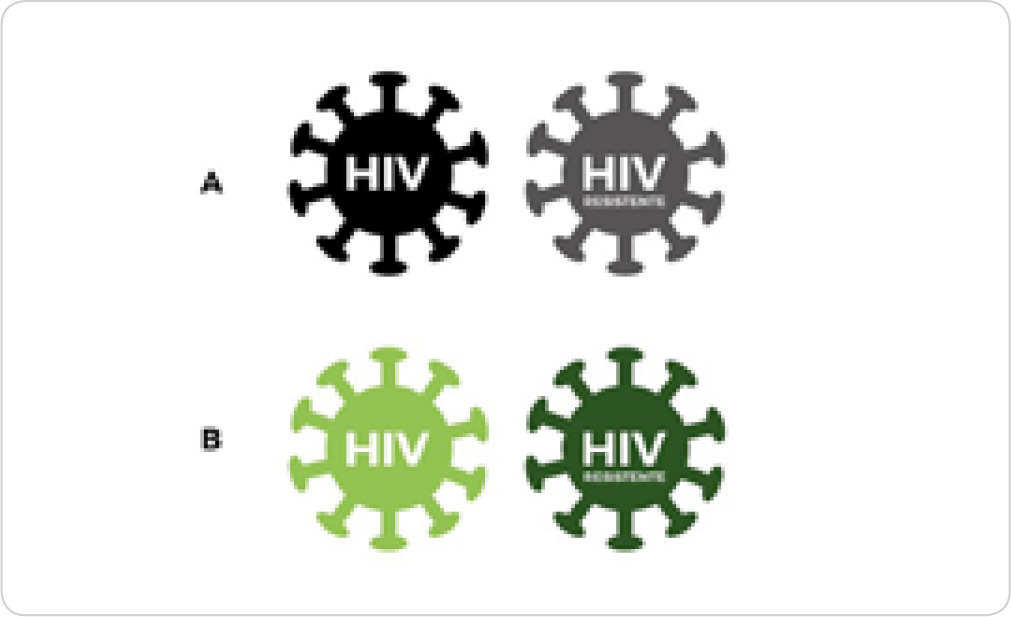
-
ORIGINAL ARTICLE08-07-2023
Content validity of the Post-Stroke Guidance and Follow-up Booklet
Revista Brasileira de Enfermagem. 2023;76(3):e20220532
Abstract
ORIGINAL ARTICLEContent validity of the Post-Stroke Guidance and Follow-up Booklet
Revista Brasileira de Enfermagem. 2023;76(3):e20220532
DOI 10.1590/0034-7167-2022-0532
Views0See moreABSTRACT
Objectives:
to provide sources of content validity evidence for the Post-Stroke Guidance and Follow-up Booklet.
Methods:
a quantitative-qualitative approach, using two Delphi method and content analysis rounds. The Educational Content Validation Instrument in Health was sent to 53 independent judges. A Content Validity Index above 0.90 was considered.
Results:
of the 14 nurses who participated, 64.3% have experience with stroke care, 35.7% with primary care and 64.3% with educational material production. In content analysis, judges’ suggestions were stratified into four categories: material conformation, objectivity, accuracy and perception. Spelling changes were made to the images, addition of functionality scale, adequacy of technical terms and language. The Content Validity Index in the second round showed a concordance of 0.97.
Conclusions:
the booklet presented satisfactory content validity sources of evidence.
-
ORIGINAL ARTICLE08-07-2023
Undergraduate nursing students’ knowledge and experience in infusion therapy and peripheral vascular acces
Revista Brasileira de Enfermagem. 2023;76(3):e20220219
Abstract
ORIGINAL ARTICLEUndergraduate nursing students’ knowledge and experience in infusion therapy and peripheral vascular acces
Revista Brasileira de Enfermagem. 2023;76(3):e20220219
DOI 10.1590/0034-7167-2022-0219
Views0See moreABSTRACT
Objectives:
to analyze the knowledge and experience of undergraduate nursing students regarding infusion therapy and peripheral vascular access.
Methods:
descriptive, cross-sectional, analytical study with 123 undergraduate nursing students who answered a semi-structured instrument.
Results:
the majority were women, with a median age of 51 years old; 87% considered the teaching received insufficient to perform in clinical practice. The mean overall knowledge score was 78.1 (SD± 8.97). The themes catheter flushing and lock (38.1%), catheter selection (34.2%), infusion equipment (30.9%) and insertion site (30.9%) presented a significant number of errors.
Conclusions:
practical classes and execution of procedures in health services were predictors for a better knowledge about infusion therapy and vascular access by undergraduate nursing students.
-
REVIEW08-07-2023
Early diagnosis of HIV/aids infection: concept analysis
Revista Brasileira de Enfermagem. 2023;76(3):e20220565
Abstract
REVIEWEarly diagnosis of HIV/aids infection: concept analysis
Revista Brasileira de Enfermagem. 2023;76(3):e20220565
DOI 10.1590/0034-7167-2022-0565
Views0See moreABSTRACT
Objectives:
to analyze the concept of “early diagnosis of HIV/Aids infection” in light of Walker and Avant’s conceptual analysis model.
Methods:
concept analysis study based on the framework proposed by Walker and Avant, instrumented by a scoping review conducted in April 2022, following the recommendations of the Joanna Briggs Institute and checklist Preferred Reporting Items for Systematic reviews and Meta-Analyses extension for Scoping Reviews. The search was made in eight data sources, obtaining sixteen articles.
Results:
the study found homosexual intercourses, early examination, anti-HIV antibodies, CD4 count, and sexually transmitted infection as the main attributes of the concept. As antecedents: information, risky behavior, unprotected sexual relations, prevention, and access to the service. As main consequences: antiretroviral treatment, seroconversion, transmission, and consultations.
Final Considerations:
the study approached the circumstantial situations of the theme, its attributes, antecedents, and consequences, qualifying the work process based on knowledge of nursing practice.
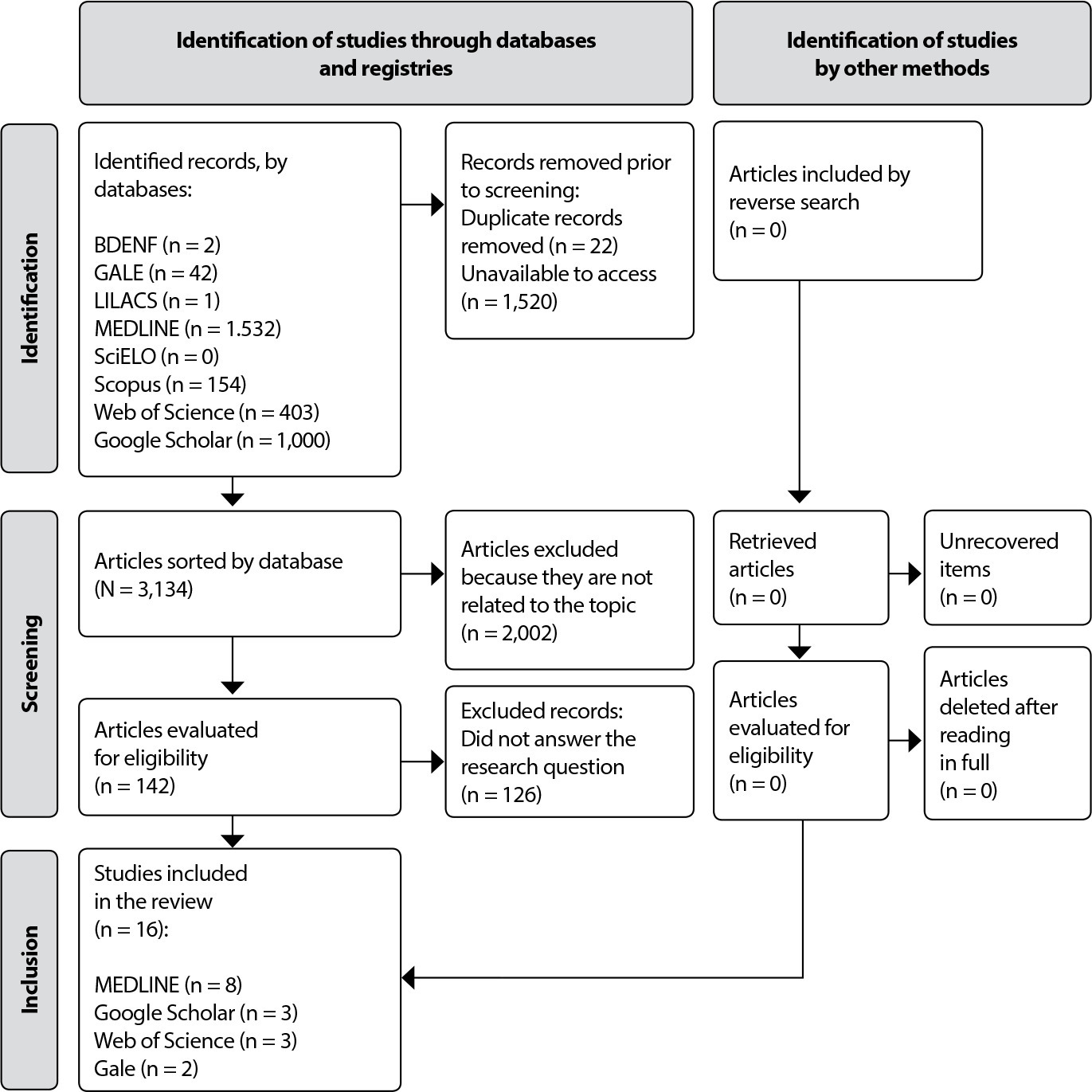
-
REVIEW08-07-2023
Instruments for assessing foot self-care of people with diabetes: a scoping review
Revista Brasileira de Enfermagem. 2023;76(3):e20220555
Abstract
REVIEWInstruments for assessing foot self-care of people with diabetes: a scoping review
Revista Brasileira de Enfermagem. 2023;76(3):e20220555
DOI 10.1590/0034-7167-2022-0555
Views0See moreABSTRACT
Objectives:
to map, in the world literature, instruments for assessing foot self-care of people with diabetes.
Methods:
a scoping review in Scopus by Elsevier, MEDLINE via PubMed, LILACS, SciELO databases and gray literature, using the controlled words diabetic foot, self care, questionnaire. Search was carried out in February and March 2021, according to JBI recommendations and PRISMA-ScR extension.
Results:
fifteen studies made up the review, 14 articles and one thesis, published between 2000 and 2020. 16 instruments were identified: five with an emphasis on general self-care and 11 on foot self-care. Inspection, hygiene, washing and drying between the toes, lotion application and use of proper shoes and socks were the main self-care measures presented.
Final Considerations:
foot self-care is assessed by knowledge, social support and frequency with which measures are being put into practice, encouraging professional practice.
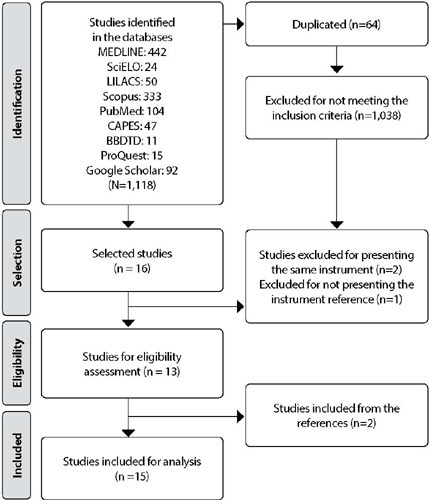
-
ORIGINAL ARTICLE08-07-2023
Workload assessment: cross-cultural adaptation, content validity and instrument reliability
Revista Brasileira de Enfermagem. 2023;76(3):e20220556
Abstract
ORIGINAL ARTICLEWorkload assessment: cross-cultural adaptation, content validity and instrument reliability
Revista Brasileira de Enfermagem. 2023;76(3):e20220556
DOI 10.1590/0034-7167-2022-0556
Views0See moreABSTRACT
Objectives:
to adapt, validate the content and assess the reliability of the instrument National Aeronautics and Space Administration – Task Load Index, translated into Brazilian Portuguese.
Methods:
a methodological study, divided into five steps: translation; synthesis; back-translation; assessment of the Portuguese version by an expert committee; pre-test and content validity of the final version by health professionals working in inpatient units. The Content Validity Index (CVI) (minimum 0.80) and Cronbach’s alpha (minimum 0.70) were calculated.
Results:
in the first round, in the agreement analysis of the translated version, three items did not reach the minimum CVI value. It was decided to remove the statement. The instrument title and items “performance” and “effort” were changed. There was consensus and approval of the final version in the pre-test step.
Conclusions:
the NASA Task Load Index instrument, adapted to Brazilian Portuguese, presents reliability and content validity evidence.
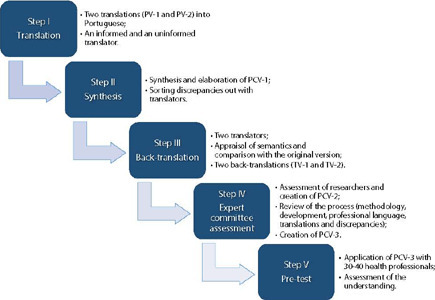
Search
Search in:
Nuvem de Tags
Enfermagem (930)Cuidados de Enfermagem (269)Atenção Primária à Saúde (239)Idoso (208)Educação em Enfermagem (151)Segurança do Paciente (150)Saúde Mental (145)Educação em Saúde (139)Estudos de Validação (131)Qualidade de Vida (104)Tecnologia Educacional (100)Promoção da Saúde (99)COVID-19 (91)Criança (91)Família (87)Enfermagem Pediátrica (86)Saúde do Trabalhador (86)Adolescente (85)Saúde Pública (82)Estudantes de Enfermagem (77)










